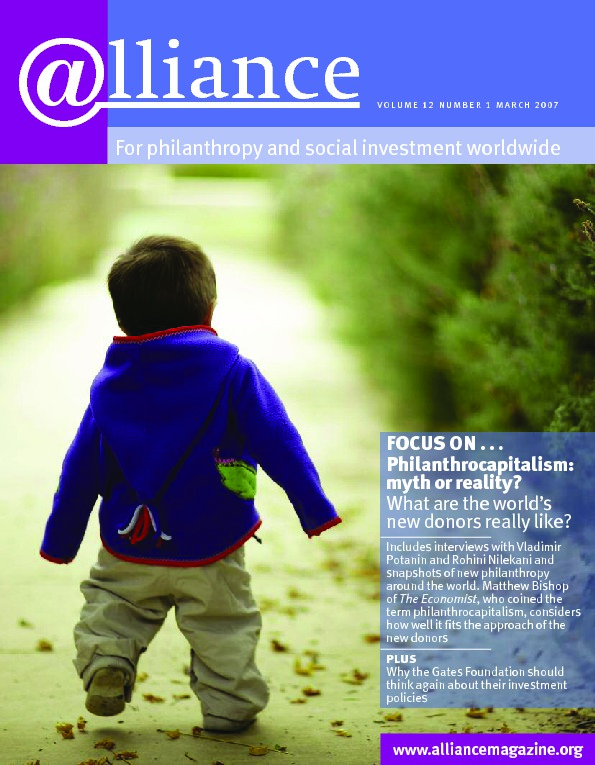Rohini Nilekani is one of India’s ‘new philanthropists’. Wife of Infosys CEO Nandan Nilekani and owner of 1.67 per cent of the Indian outsourcing company, when she found her personal fortune soaring to about $300 million as the company stock rose, she began to look for ways to give money away. So far she has provided a total of $37 million to two foundations, Akshara Foundation and Arghyam Trust.
What is innovative about the way she does things, Caroline Hartnell asked her. And what has she learned from other foundations, in America and in India? Asked whether she sees herself as a philanthrocapitalist, Nilekani feels less than happy with the label.
What Rohini Nilekani sees as innovative and different about the way she’s doing things is the way she has brought together the opportunities that coming into money has given her and her earlier work in the social sector, with ‘all its emotional charge towards equity’.
‘So it’s not like doing the charity that was the norm in India. I have had many opportunities to broaden my perspective on the world at large and India in particular. So it was quite easy for me to say, “OK, you have this extra money, now what are you going to do with it?” And it was so exciting, there were so many opportunities.’
The Akshara Foundation is part of a very large national initiative, the Pratham educational network. Akshara has worked to creatively engage half a million children in the state of Karnataka over the past seven years and has a scalable model for public-private partnership with the goal: Every child in school and learning well.
But it’s in her work with the Arghyam Trust, set up with a personal endowment of approximately $25 million two years ago, that she sees the most exciting opportunities. ‘The focus of that trust is water,’ she says, ‘and it is almost like a green field. You can really innovate, you can work with small players and large players, you can bring water to the centre stage of the development debate – and that’s what we’ve been trying to do for the past two years.’ Just recently, the Prime Minister of India, Manmohan Singh, launched an Arghyam-facilitated, web-based, gis-enhanced collaborative platform, named the India Water Portal, to share knowledge and best practices across the water sector in India.
The other organization she is very proud of is Pratham Books, established three years ago. She describes this as ‘an extension of the education work’. Through the Pratham network, she explains, they had created literally hundreds of thousands of new readers, but there was nowhere near enough good quality reading matter available for them.
Pratham Books has achieved an impressive amount in its three years of existence: more than 2.5 million copies of about 150 new stories for children aged 3-12 printed and distributed, and translated into as many as ten Indian languages. It is also tremendous value for money. ‘We’ve developed a model that is slightly subsidized but not that much,’ Nilekani explains, ‘and we can see it becoming completely self-sustaining in the future. I personally put in a very little money, and that’s the beauty of it: if you put a little money in a place that has a huge market or social need, it reaps huge rewards.’
What day-to-day role does she play?
Rohini Nilekani plays a day-to-day role in all three organizations. ‘I’m not just a donor,’ she says emphatically. Between the three organizations, she admits, she’s there ‘pretty much all the time’. But she is equally emphatic that she does not need to run them herself. ‘’There is a fantastic team of people who are incredibly committed to making our goals happen.’
So what is her involvement apart from as a donor? It is considerable, apparently. ‘Of course I’m involved with the strategy, and with external relations, because thanks to the situation I’m in I can reach out to other people. So I bring that definitely. And because of my passion I tend to meddle a bit regularly, but I try to more and more professionalize my interaction with these organizations.’
What has she learned from American foundations …
According to a recent interview with Time magazine, Rohini Nilekani is learning a lot from the Bill and Melinda Gates Foundation. ‘That’s one part of it, certainly,’ she says. ‘I was asked the question whether I’m learning from the Gates Foundation and I said most definitely yes I am, along with other foundations such as the Soros Foundation. We in India – and when I say “we” I can certainly include some of the new philanthropists I know, and perhaps Nandan, my husband, and certainly me – have a lot to learn from American philanthropy, and from Europe too. And the Bill and Melinda Gates Foundation has definitely been one of the inspirations.’
So what are the things that particularly impress her about the American foundations? Nilekani answers without hesitation: ‘A lot of Indian philanthropy so far has been working through our family, our caste, our traditions, our community. When I see American philanthropy – the Rockefeller, Ford, Carnegie and Mellon Foundations, for instance – I see immediately they’ve separated the self and family from what they do. That separation is what really interests me. It’s not about me, my family, my grandchildren, my great grandchildren. Rather, we look at ourselves as beneficiaries of certain social processes at a certain time and in a certain political climate, and see what kind of general responsibility we have to give back and to make our giving reap its own dividends.’
Nilekani also likes the way American foundations use professional management practices. ‘They are not run on the whims and fancies of someone like Rohini Nilekani, there’s an organization, there are good governance practices, there are outcome indicators, there’s an efficient team.’ In foundations where she’s not the only donor, Nilekani often also wears ‘the hat of the fundraiser’, and here ‘this whole idea of transparency and accountability’ seems particularly relevant.
… and from other Indian foundations?
What about longer established Indian foundations like the Tata Foundations? Has she also learned from them? Nilekani is quick to acknowledge her huge debt to the Tatas. ‘All of us in India who consider ourselves to be in any way a philanthropist, I think we all stand on the shoulders of giants like the Tatas. This is something I feel more and more. Wherever I turn, if I find a partner that I want to work with, somewhere in the journey of the successful partner, they have been funded by the Tatas – or perhaps by the Ford Foundation or the Rockerfeller Foundation. How much has been spawned by such large visions!’ She also likes the fact that the Tatas don’t ‘blow their own trumpets about it’.
Is she a philanthrocapitalist?
Asked if she sees herself as a philanthrocapitalist, Nilekani is much less sure. She admits to being results-oriented, and on the whole she’s a hands-on philanthropist. But only ‘on the whole’.
‘There has to be a mixed portfolio,’ she says. ‘For instance, I recently gave a substantial – by Indian standards – grant to a publication that has done a great deal of work on deepening democracy, and it’s making me feel so glowy and happy, but that’s off the record, it’s one of the silent things one does. I believe some things need to be given in a public space, but there are some things you want to do quietly, the sort of whimsical good things that you do because they fit into your general philosophy.’
Coming back to the term philanthrocapitalist, Rohini Nilekani is definitely not comfortable with ‘the capitalist bit’, seeing it as a ‘very loaded term’. The term capitalism, she says, ‘has its own definitions, its own space and its own recommendations, but whether it necessarily captures what I’m doing, I’m not sure.’
But she suggests an alternative – philanthroglobalist. ‘That’s much better than capitalist because that’s so narrow. I think we’re looking at a whole new global paradigm. How’s that?’
For more information
http://www.aksharafoundation.org
http://www.arghyam.org
http://www.prathambooks.org
Or contact Rohini Nilekani at rohini@arghyam.org



Comments (0)